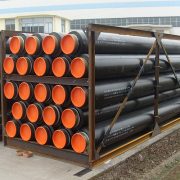PU Foam Thermal Pre-insulated Steel Pipes for Hot Water Network
In industries where hot water distribution is essential—such as district heating systems, oil and gas facilities, and industrial processes—thermal insulation plays a critical role in maintaining energy efficiency, reducing heat loss, and ensuring the longevity of pipelines. One of the most effective solutions for thermal insulation is PU Foam Thermal Pre-insulated Steel Pipes.
In this blog post, we will explore the design, benefits, applications, and key considerations of PU foam thermal pre-insulated steel pipes, focusing on their relevance to the oil, gas, fuel, and water transmission industries. This post will provide clear guidance for professionals and engineers looking to maximize efficiency, minimize corrosion risks, and extend the service life of their hot water networks.
What are PU Foam Thermal Pre-Insulated Steel Pipes?
PU Foam Thermal Pre-insulated Steel Pipes are steel pipes surrounded by a layer of polyurethane (PU) foam, which serves as the thermal insulating material. These pipes are designed to transport hot fluids, such as water, while minimizing heat loss during transmission.
The typical structure of these pipes includes:
- Steel Carrier Pipe: The inner steel pipe carries the hot water or other fluids. It is usually made from materials such as carbon steel or stainless steel, depending on the application’s pressure and temperature requirements.
- Polyurethane Foam Insulation: A layer of rigid polyurethane foam surrounds the steel pipe, providing excellent thermal insulation. PU foam is one of the most efficient insulation materials, with low thermal conductivity and high durability.
- External Protective Casing: The foam insulation is encased in an outer protective layer, often made from high-density polyethylene (HDPE), which shields the foam and steel from environmental elements like moisture, mechanical stress, and chemical exposure.
This multi-layer construction ensures the pipe maintains high thermal efficiency while protecting against corrosion and physical damage.
Key Features and Benefits
1. Superior Thermal Insulation
- Minimized Heat Loss: PU foam has very low thermal conductivity (typically around 0.022-0.029 W/m·K), making it an excellent insulator. By minimizing heat loss, these pipes significantly enhance energy efficiency in hot water networks.
- Consistent Temperature Maintenance: The foam insulation ensures that the temperature of the fluid within the pipe remains consistent over long distances, reducing the need for additional heating and cutting down on energy consumption.
2. Corrosion Resistance
- Protection from External Corrosion: The outer casing, usually made from materials such as HDPE, protects the steel carrier pipe from exposure to moisture, chemicals, and other corrosive elements found in the environment. This is especially important in buried pipelines where soil moisture and chemicals could otherwise cause the steel to corrode.
- Longevity of the Steel Pipe: The insulation system significantly extends the lifespan of the steel carrier pipe by preventing direct contact with corrosive elements. This results in a more durable and reliable pipeline that requires less maintenance over time.
3. Energy Efficiency and Cost Savings
- Reduced Energy Loss: The superior thermal insulation provided by the PU foam reduces energy loss during the transmission of hot fluids. This leads to lower operational costs, as less energy is required to maintain the desired temperature within the pipeline.
- Lower Operating Costs: By reducing the need for additional heating, companies can save on fuel or electricity costs, making their operations more energy-efficient and cost-effective in the long run.
4. High Mechanical Strength
- Durability in Harsh Conditions: The steel carrier pipe, combined with the protective outer casing, ensures the pipe system remains robust and resistant to external physical damage, such as impacts, abrasions, and handling during installation.
- Resistance to Pressure and Temperature Variations: The steel carrier pipe can withstand high internal pressures and temperature fluctuations, making it suitable for transporting hot water and other fluids in demanding environments.
5. Ease of Installation and Maintenance
- Pre-Insulated Design: These pipes are manufactured with the insulation already applied, simplifying the installation process. The pre-insulated design reduces on-site labor, minimizes installation time, and ensures consistent insulation quality.
- Reduced Maintenance Requirements: Thanks to the protective outer casing and corrosion resistance, PU foam pre-insulated pipes require less frequent maintenance, reducing downtime and overall maintenance costs.
Common Applications of PU Foam Thermal Pre-Insulated Steel Pipes
1. District Heating Systems
PU foam thermal pre-insulated steel pipes are widely used in district heating networks, where they transport hot water from central heating plants to residential, commercial, and industrial buildings. The excellent thermal insulation of these pipes ensures minimal heat loss during transmission, making them ideal for long-distance hot water distribution.
2. Oil and Gas Industry
In oil and gas operations, maintaining the temperature of fluids is essential, especially when transporting hot water or oil over long distances. PU foam pre-insulated steel pipes provide the necessary insulation to maintain fluid temperature while preventing heat loss. This is particularly important in offshore and remote locations, where energy efficiency and corrosion resistance are critical.
3. Industrial Processes
Many industrial facilities rely on hot water for various processes, such as steam generation, chemical reactions, and heating systems. PU foam thermal pre-insulated steel pipes offer the insulation and protection needed to ensure efficient hot water delivery within these facilities, contributing to higher productivity and lower energy consumption.
4. Geothermal Heating Systems
PU foam insulated pipes are also used in geothermal heating applications, where hot water is transported from geothermal sources to buildings or industrial sites. The insulation ensures that the temperature of the water remains stable, maximizing the efficiency of the geothermal energy system.
Key Considerations for Selecting PU Foam Thermal Pre-Insulated Steel Pipes
1. Temperature and Pressure Requirements
When selecting pre-insulated pipes, it is essential to consider the operating temperature and pressure of the hot water or fluid being transported. The steel carrier pipe must be strong enough to handle high pressure, while the PU foam insulation should be rated for the expected operating temperature.
2. Corrosion Protection
Although the external casing provides protection against environmental factors, additional measures such as cathodic protection or external coatings may be necessary in highly corrosive environments. This is especially important in areas where the pipeline is exposed to chemicals, saltwater, or harsh soils.
3. Pipe Diameter and Length
The diameter and length of the pipe should be carefully selected based on the required flow rate and distance of transmission. Pre-insulated pipes are available in a range of diameters to accommodate different fluid transmission needs. Large-diameter pipes may be necessary for district heating systems or industrial facilities with high hot water demand.
4. Thermal Expansion
As the pipeline operates at high temperatures, thermal expansion is a natural phenomenon that must be managed. Expansion joints or compensators should be included in the pipeline design to account for this expansion and prevent damage to the pipeline system.
5. Installation Considerations
Pre-insulated pipes are typically delivered in sections, and proper installation is crucial to maintaining the integrity of the insulation. Jointing techniques, such as welding, must be carefully managed to ensure that the insulation remains continuous and effective throughout the pipeline system.
Advantages of PU Foam Thermal Pre-Insulated Steel Pipes Over Conventional Piping Solutions
- Higher Energy Efficiency: PU foam pre-insulated pipes offer superior insulation compared to traditional piping solutions, reducing energy loss and lowering operational costs.
- Longer Service Life: The combination of corrosion-resistant materials and durable insulation extends the pipeline’s service life, making it a more cost-effective solution over time.
- Lower Environmental Impact: By reducing energy consumption and heat loss, these pipes contribute to lower greenhouse gas emissions, making them an environmentally friendly choice for hot water networks.
- Versatile Applications: These pipes are suitable for a wide range of applications, from district heating to oil and gas operations, making them a versatile choice for industries that require efficient heat management.
Conclusion
PU Foam Thermal Pre-insulated Steel Pipes are an excellent choice for hot water networks in a variety of industries, including district heating, oil and gas, industrial processes, and geothermal systems. Their superior thermal insulation, corrosion resistance, mechanical strength, and ease of installation make them a valuable asset for any system that requires efficient hot water transmission.
By choosing PU foam pre-insulated pipes, companies can achieve significant energy savings, reduce maintenance costs, and ensure the long-term reliability of their pipelines. For professionals in oil, gas, fuel, and water transmission industries, understanding the benefits of these pipes and incorporating them into their designs is key to improving the efficiency and durability of hot water networks.


